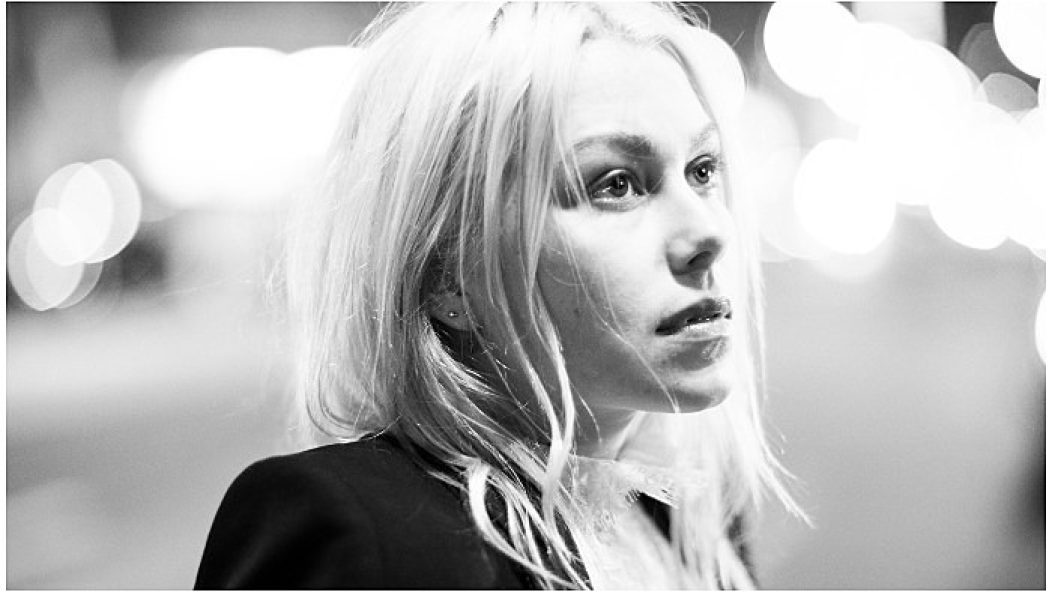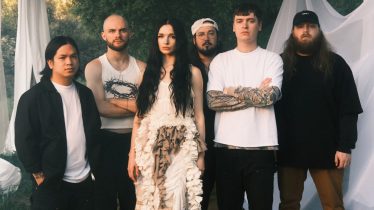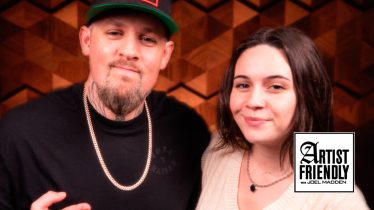
Phoebe Bridgers wants to see more diversity behind the scenes of music
Phoebe Bridgers and I were digital friends first. We followed each other from afar, orbiting gravitational loops of likes and story views before somehow aligning at the cosmically precise degree to which we still met strangers from the internet. This feels fitting, or almost fated: A lot of the time, Phoebe reminds me of the good parts of cyberspace. She’s goofy, weird, relatable; in person, as in her music, she has a gift for zooming in and out on the world, her insights alternately expansive and deeply intimate. Our conversations rapidly cycle through galaxy brain schemes, trauma bonding and BV jokes, like our friendship is some processing unit trying to convert the endless coded data of existence into something we understand. (The original transcript for this interview was 11,000 words—27 pages—and my transcription software assumed there were four of us speaking at any given time. The software has a sensitive algorithm; it took me over an hour to fill all the gaps where it had removed the word “fuck.”) One of the only decent things about 2020 was watching good things happen to such a generous and generative artist.
Read more: Phoebe Bridgers writes tattoos to raise money for Daunte Wright’s family
It seems hard to avoid having success in a way that just recreates oppressive power structures. What’s that been like for you? How do you work around that?
Infiltration is first, unfortunately. Especially for music. You have to participate in these archaic forms of making stuff that can be really exhausting. And now I do wield a certain amount of power—I have hiring capabilities at my label. I have hiring capabilities with my band. I actually have the power to make this system different from what I had to deal with when I was coming up and getting 360 deal offers for $10,000 when I was 18. It was $10,000 for 20 years of my life. That’s what [they] tried to buy me for.
That’s some Scientology contract bullshit. I assume you said no.
Oh yeah. It was a turning point for me, where I was like, “Oh, maybe sometimes you do have to just wait for the right moment.” A couple of years later, I got my Secretly Canadian deal, which of course I liked so much that I started my own label there, Dead Oceans. But I hate how even at the time, I was gaslit by people around me. My lawyer was like, “I don’t know. It’s a pretty cool opportunity.” And I had to fire her. I was like, “I don’t think you’re right.”
How shitty to just be like, “I think that your entire life is never going to be worth more than $10,000.”
I think you smell those people coming, though. You’re just like, “Oh, this person thinks that this is the end of the road.”
Yeah, they just wanna cut and run. I think that’s probably good advice—to wait for good people.
Totally. Surround yourself with people where you can tell they’re not making it up when they say they like it or people you genuinely like hanging out with. I think it took me a really long time to figure that out. You know, the whole introvert/extrovert thing. Like, are you exhausted by or refueled by people? I consider myself an introvert actually, but I’m fueled by people I enjoy. You came to my birthday that year, where I was like, “I’m going to write a list of people I feel like I should invite. And I’m going to write a list of people I want to invite. And I’m going to delete the list of people I should invite.” It was the best. I could have hung out all night. So yeah, just surrounding yourself with people you like.
There’s this beautiful Hannah Black essay where she talks about how the etymology of the word “gossip” is that in the middle ages, it just meant “friend.” And then because of patriarchy and shittiness, it became weaponized and devalued as a term and turned into this frivolous thing. Used correctly, gossip networks are ways we can say, “Hey, this experience happened to you too? This is a pattern.” It can be really useful. So, I like to think that we’re trying to just gossip for good, maybe.
Yeah. That framing sounds like institutional gaslighting. “You should hang out with your friends less.”
It’s really gaslight-y, like how some jobs don’t want you to talk about your salary to other people.
Oh, like music?
Oh yes, that’s the one.
I’ve had huge studios be like, “Our budget for owning a song of yours is $500.”
And then if you say no, you’re “difficult.”
Oh, I know that I have a reputation for being difficult. There’s this capitalistic and totally horseshit angle that some people take, where it’s like, “It’s music, man. Why are you letting business or money get in between me and music?” I’m like, “I’m talking to a billion-dollar company that’s trying to fuck me. It’s not art anymore. You’re trying to take it, and you’re telling me that it isn’t of value.”
And then it’s like, “OK, if my work is so special, then value it.” That also feels like gaslighting, all of these weird alternate economies that exist in creative scenes, where you’re told that you’re shady or sharky for wanting to have monetary capital instead of exposure or clout. It’s like, “Well, yeah, we live in a society, my guy. Clout’s cool, but it doesn’t feed me.”
I grew up with no money, and I think growing up, I was like, “Well, it can’t just be that money fixes everything.” And then when I started making it and got a car and an apartment, I was like, “Wait, I’m free. I can write music in the nighttime and not worry about shitty roommates banging on my wall. I can drive to the grocery store.” It literally does free you up. I feel like the only people who say that money doesn’t matter have money. Being able to function in society and make what you’re making is so elusive.
That idea of having to exist in this problematic system for a while and then not—was there a specific moment where you realized that you were big enough to use your platform in a way that feels different from how most cis straight white dudes throughout history have used a music platform?
I think the whole Ryan Adams situation was the first time. When I was first starting and made the seven-inch with Ryan, and had a really, really bad experience, I gaslit myself about it for a really long time. I was like, “It was probably good. And I’m just the asshole.” There was this situation where he read one of my interviews where I said he was kind of a dick—and I only said he was a dick; I didn’t even say anything about abuse—and he called the blog and told them to take it out. Which they did! He’s that kind of guy—like he reads shit talk about himself on the internet all day.
That to me is like the No. 1 sign of a really deranged narcissist—someone who wants to read their bad press all the time. I think that’s a really crazy impulse.
He would play 3,000-capacity venues, and he would find one person on Twitter who was like, “That was a boring show,” and he would threaten them. I really feel bad for people like that. It’s all-consuming. Like, if I wanted to confirm that the internet hates me, I could, right now. I’m getting death threats as we speak. I could also tell myself, which some people do, that everybody loves me and I’ve never done anything wrong and I’m the center of the world. That’s just how the internet works. You can find any opinion and focus on it.
Totally. Sometimes I think of algorithms as weird manifestation tools—the more that you consume something, the more the algorithm shows you the same kind of thing.
Yeah, he manifested a New York Times article.
Well, I feel like he manifested that by being an abuser.
So that interview happened, where they took it out, and then I was like, “OK, fuck this motherfucker.” But before that, my record wasn’t out yet. I was like, “If I come out and talk about my horrible experience, I will be forever defined as that person who did that.” If I put that before my record, it’ll be like, “Oh, the Ryan Adams girl?” I also wasn’t talking to anybody at the time who’d had bad experiences. So, I felt horrible about it, but I waited. I waited to be confronted with the right time. And I think I’m still sometimes defined as that, and I have to talk about it all the time, but I think that was the first time where I was like, “Oh, I have power, now that I’m in this, to change it.” Whereas before, I think I would have been outside of it. I could have tweeted a long thread about it, but I waited for somebody to give a shit, and I waited to meet other people with a shared experience. I didn’t give my whole story until the right time. That was the first time in my life that I was like, “I’m going to disrupt. It’s time to disrupt.”
God, yeah. I didn’t “call out” the dude who sexually assaulted me for a couple of months. It was that thing of slowly recognizing that it wasn’t a one-off; it was an intentional pattern of behavior. You don’t want to get into carceral virtue signaling or be wrong. And I really carried that shame about not saying something sooner for years. I think that goes back to your responsibility to people as a public-facing artist—if you are a caring person who wants to do right in the world and you have a platform, it’s really hard to not feel like you’re constantly not doing enough for people or like you’re not doing things fast enough. And in reality, that’s not always true or the whole story. It would not have benefited literally anyone for you to have made that choice any sooner, for you to have not done right by yourself, your career and your creative fulfillment. That would have been horrible.
Totally. I couldn’t have been articulate. I would have been alone. I think that’s definitely a situation where I had to infiltrate the system first. But also, I feel bad because obviously, he has such a public-facing platform that the New York Times gave a shit. If you work at Starbucks and your boss feels you up, how do you deal with that? It’s such a different system. I’m dealing with a public system where now I do have power, where if I tweet about something, people take it seriously. But if you’re not public-facing, it’s just… I don’t know what the answer is.
Also, at some point, it’s like, “Do I have the time and the emotional resources, or even the expertise, to deal with this? I can empathize, but am I actually doing anyone a service by walking them through a difficult scenario?” You want to show up, but also at some point, it ruins you.
Yeah. But I love that we’re normalizing, like, Venmoing your fucking friends. I love that. I love it so much. And of course it starts with people in communities who have less money. I’d love to see more of that with my richer friends.
The internet is such a good place for that. The internet also is a horrible place where you can find people who want you to die at any given moment during the day. But also, it’s really nice to have this space where there are all these exchanges of experience. The normalization of a lot of human experience is a cool thing, I think, generally.
Totally. I think there’s a community problem in music—performers look so different from people behind the scenes. There are very few queer people, people of color or women in administrative, boring-ass jobs. When they do enter music, they’re being pushed to the forefront, like, “Be an advocate for this system.” Once I started having hiring capabilities or signing capabilities or whatever, turning the room that you work in or enter into somewhere where you share something with people is invaluable. I think community is what makes you powerful. Just watching people speak up for themselves, or communicate something that you’ve been trying to communicate for a long time, who look like you. We’re all copying everybody all the time.
You can read the full interview in Alternative Press’ debut Power Issue: Women Rising, available here.








